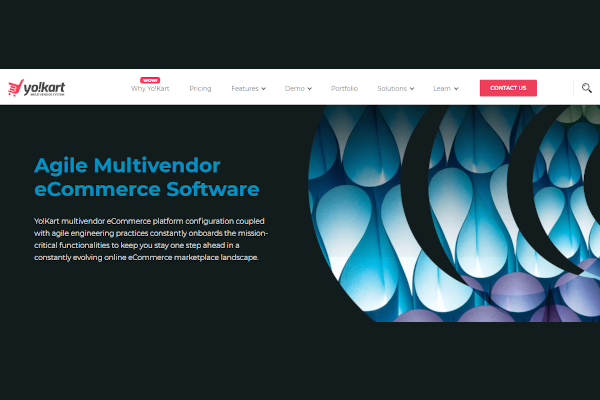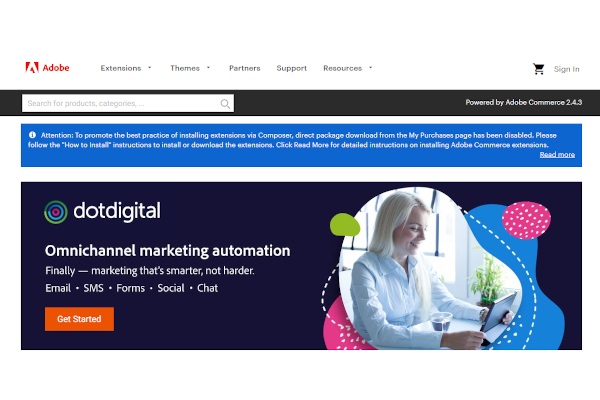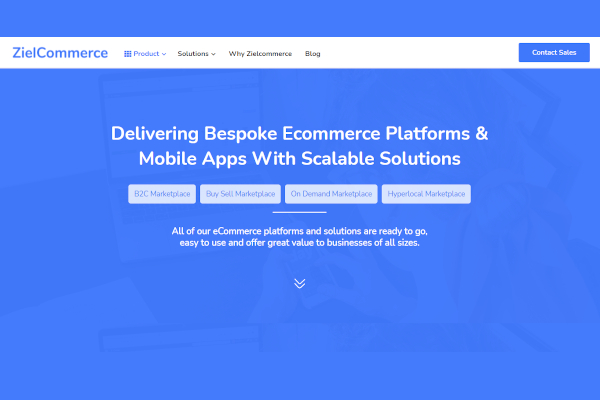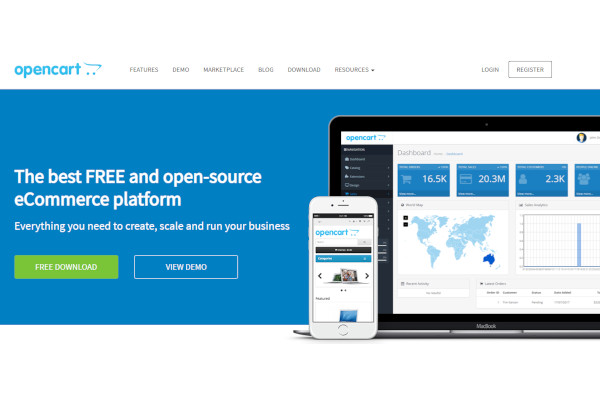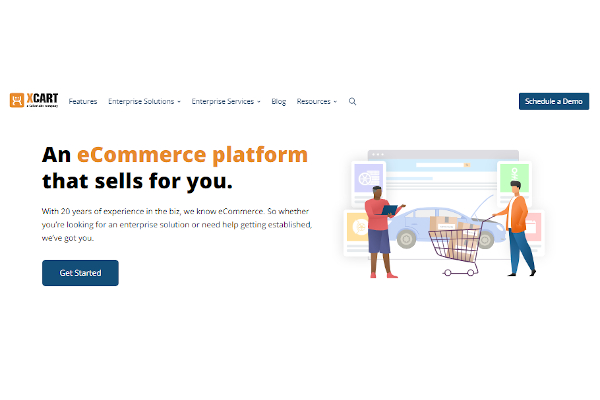Varying physical stores operating next to each other is nothing new in the business industry. Although, as more consumers choose to purchase through online platforms, most businesses also adapt to this significant change. They started moving to online multi-vendor marketplaces and digitizing business transactions instead. That said, cater to the vendors’ needs and aim to meet the demands of the buyers by setting up your very own platform with robust multi-vendor marketplace software.
11+ Multi-Vendor Marketplace Software
1. Cs-Cart
2. Yo!Kart Multi-Vendor Solution
3. Shopygen – Genstore Script
4. BigCommerce
5. Arcadier
6. Magento Marketplace Extension
7. Zielcommerce
8. PrestaShop Marketplace Module
9. WordPress Dokan Plugin
10. OpenCart
11. X-Cart
12. Spree Commerce
What Is Multi-Vendor Marketplace Software?
Multi-vendor marketplace software offers multiple vendors a platform for selling their products online. It integrates varying processes in a centralized interface giving its users the ability to manage various business functions using their digital devices. Also, this software offers a different control panel to the admin and the vendors. It provides administrative controls allowing the admin to tailor the settings and functionalities to cater to the business ideas and needs of the vendors.
With it, you can access online payment gateways and digital tools for gathering essential data analytics. In addition, it has an order management system and other fundamental interface elements for the marketplace sellers.
Benefits
This technology has business process automation capabilities that simplify the tasks and activities you need to undergo for your daily operations. Also, it eliminates repetitive and menial processes involved in managing a platform that involves multiple vendors. Consequently, it lightens workload and reduces necessary expenses, letting you save and spare more resources for more important matters.
Features
When you visit the software market, you can discover plenty of digital solutions with overlapping functionalities and varying specializations under this category. That said, selecting which one to equip for your business takes more than just looking at their interface designs and prices. Singling out which one is most suited for you entails studying other essential factors such as supported digital devices, compatibility with various business sizes, and the services included in their software packages and subscription plans. Also, you should take the following features into account:
- Business dashboard
- Payment processing gateways
- Order management functionalities
- Multiple storefronts
- Product listing tools
- Business instant messaging platform
- Profile page setup tools
- Categorization tools for vendors
- Content management and editing functionalities
- Third-party applications integration
Top 10 Multi-Vendor Marketplace Software
1. Magento Marketplace Extension
With this digital solution, you can streamline SEO management and sale conditions management. They have a revenue of 800 million dollars and have employed 1,500 people.
2. BigCommerce
This eCommerce software has an integrated eCommerce CRM software and has customer loyalty program functionalities. They have 100 people on their team and have 123.5 million dollars in revenue.
3. OpenCart
OpenCart provides its users with features for product reviews management and product configurator. They have 37.7 million dollars in generated revenue and have 140 people working for them.
4. X-Cart
Tools for deployment management and inventory control are accessible in this software. They have 100 people in their team and have a generated revenue of 27.5 million dollars.
5. PrestaShop Marketplace Module
You can streamline returns management and utilize online store builder tools in this website builder solution. They have generated a revenue of 17 million dollars and employed 120 people.
6. Arcadier
This marketplace builder software has order management and cataloging functionalities. They have 45 people working for them and have a revenue of 6.5 million dollars.
7. Cs-Cart
When you use this eCommerce marketplace software, you can access channel management and mobile commerce tools. They have 5 million dollars in revenue and have over 25 employees.
8. Spree Commerce
Integrated development environment and communication management functionalities are examples of features in Spree Commerce. They have 1.2 million dollars in revenue and have eight employees.
9. Zielcommerce
Zielcommerce is an online marketplace platform that has payment processing gateways and promotions management capabilities. They have ten employees in their team and have a revenue of 1 million dollars.
10. Shopygen- Genstore Script
This digital solution provides its user with tools for commission management and a vendor portal. They have a generated revenue of 1 million dollars and have ten employees.
FAQs
What are the differences between a single-vendor and multi-vendor marketplace?
Single-vendor marketplaces and multi-vendor marketplaces vary in terms of the number of vendors they can host. For single-vendor platforms, one seller can leverage the marketplace to connect to multiple buyers. On the other hand, multi vendor platforms accommodate several vendors that sell varying goods and services to existing and potential customers.
What are the various types of marketplaces?
The marketplaces you can find online encompasses a wide range of businesses that offer different types of goods. Some examples include service-based and product-based marketplaces. The former presents a list of service providers providing various services, and the latter provides a platform for online vendors selling a variety of products. Also, there are online rental marketplaces that meet customer needs regarding reservations and online bookings.
What are tips for managing a multi-vendor marketplace?
To increase the effectiveness of your multi-vendor marketplace management, you need to ensure the success of several activities, such as shipping management, order fulfillment, and online inventory management. Also, consider utilizing digital solutions to automate the calculation and charging commissions and fees to the vendors. In addition, you should develop a compelling digital marketing strategy to pique the interest of vendors and customers.
Managing multi-vendor marketplaces is a challenging and demanding task. In establishing and developing a platform, you need to pivot your strategies and methodologies while considering the demands of both the vendors and customers. Despite that, you can take items off your plate and increase productivity and efficiency by going digital and gaining the best multi vendor marketplace software at your disposal. That said, secure yours as early as now.
Related Posts
10+ Best Chemical Software for Windows, Mac, Android 2022
12+ Best Vulnerability Scanner Software for Windows, Mac, Android 2022
4+ Best Bundled Pay Management Software for Windows, Mac, Android 2022
10+ Best Trust Accounting Software for Windows, Mac, Android 2022
10+ Best Patient Portal Software for Windows, Mac, Android 2022
13+ Best Virtual Reality (VR) Software for Windows, Mac, Android 2022
12+ Best Bed and Breakfast Software for Windows, Mac, Android 2022
15+ Best Resort Management Software for Windows, Mac, Android 2022
14+ Best Hotel Channel Management Software for Windows, Mac, Android 2022
12+ Best Social Media Monitoring Software for Windows, Mac, Android 2022
10+ Best Transport Management Software for Windows, Mac, Android 2022
10+ Best Other Marketing Software for Windows, Mac, Android 2022
10+ Best Top Sales Enablement Software for Windows, Mac, Android 2022
8+ Best Industry Business Intelligence Software for Windows, Mac, Android 2022
10+ Best Insurance Agency Software for Windows, Mac, Android 2022


